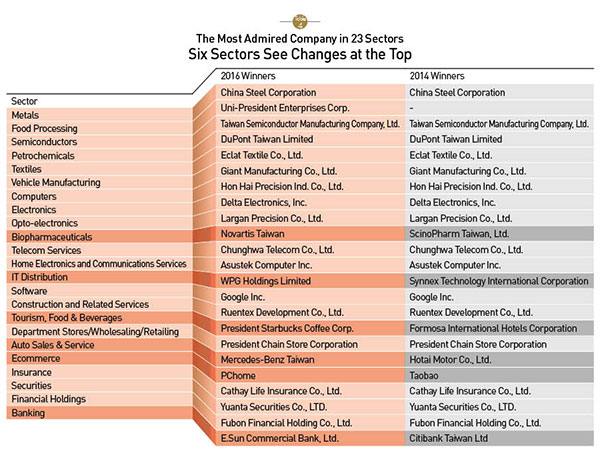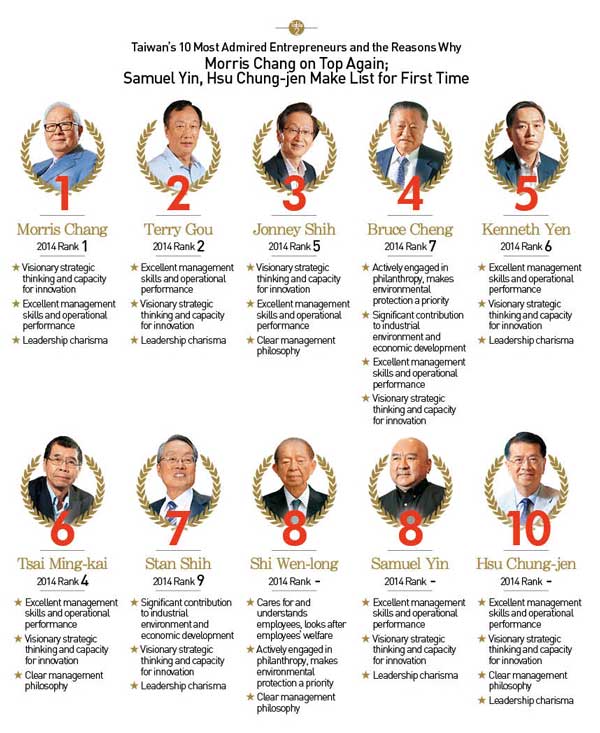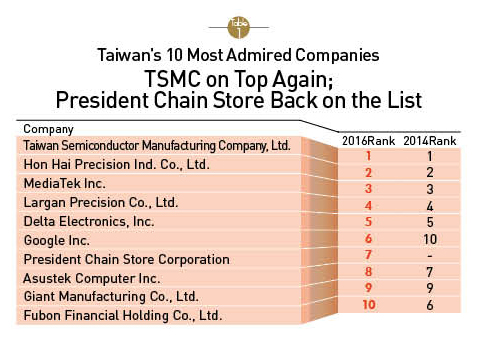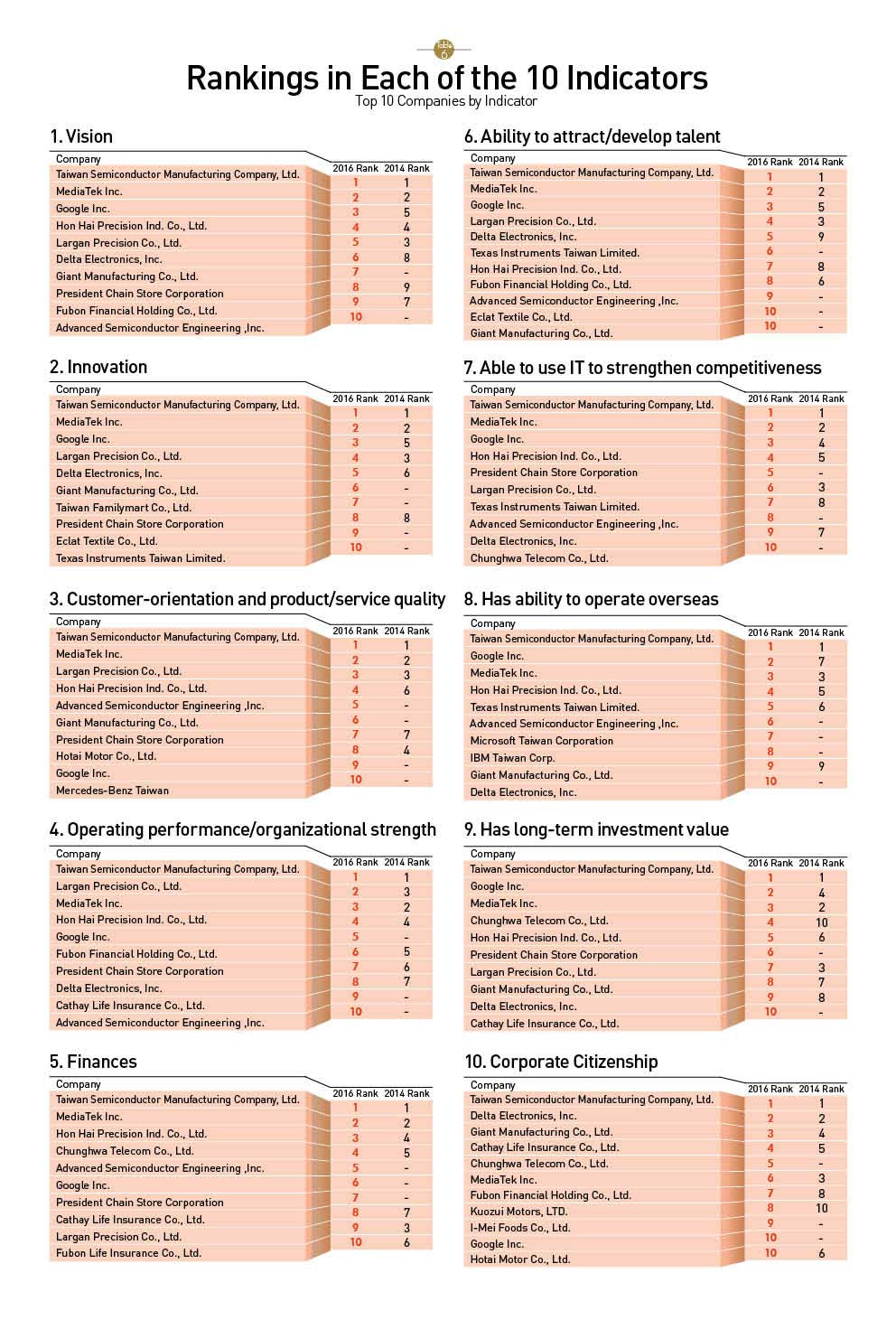2016 Most Admired Company Survey
Taiwan’s Champions of Transformation
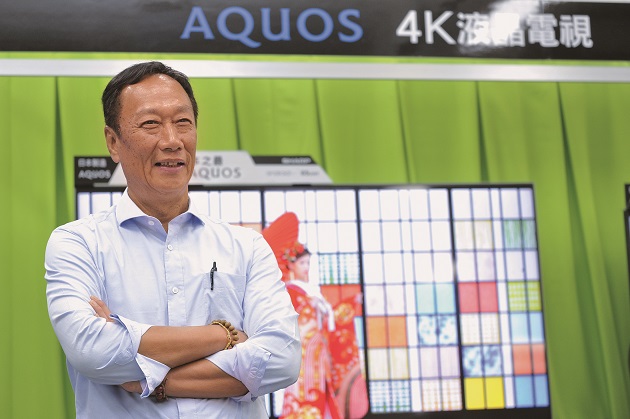
Source:CW
New technologies, increasing connectivity and industry convergence are rewriting the way companies do business. How do Taiwanese industry bellwethers such as TSMC, Hon Hai and President Chain Store innovate to remain relevant for decades to come?
Views
Taiwan’s Champions of Transformation
By Pei-hua YenFrom CommonWealth Magazine (vol. 609 )
“Innovate or die!” is a famous quote by the late American management guru Peter Drucker. It aptly describes in a nutshell the challenge that companies around the world are currently facing, and the next three years will be critical in determining whether they successfully transform themselves.
Governments around the globe are pushing policies for an innovation economy, and innovation will be even more crucial for the survival of individual companies as past models of success no longer work.
More than 40 percent of some 1,300 CEOs in 11 economies surveyed by international management consulting firm KPMG expect their companies to be transformed significantly in three years’ time. And 82 percent of those surveyed for the 2016 Global CEO Outlook voiced concern whether their company’s current products or services will be relevant to customers three years down the road.
Apparently, CEOs across different sectors sense they are facing a “now or never” scenario, with 72 percent of the CEOs who responded to the KPMG survey believing that the next three years will be more critical for their industries than the past half century.
These epochal changes will be driven by new technology, connected consumers and sector convergence, according to the survey.
How do Taiwanese companies cope as a wave of disruptive innovation sweeps across the globe?
Lack of Innovation Undermining Prospects
In May 2005, BusinessWeek magazine singled out Taiwan’s high-tech sector for its “do-whatever it takes ethos, ” “ever-more-ingenious solutions to manufacturing and design conundrums” and quick reflexes to market trends and customer needs. In an article titled Why Taiwan Matters, the magazine highlighted Taiwan’s vital role in the global technology supply chain.
Not even 10 years later the New York Times concluded that the island had gambled away its leading IT position. An article titled In Taiwan, Lamenting a Lost Lead, published on May 12, 2013, squarely blamed a lack of innovation for the woes of Taiwan’s high-tech sector.
“If Taiwan’s listed companies do not face this critical transformation period in the coming three years, if they do not innovate and transform, then a whole bunch of them might go under," says Morris Hsieh, director of Technology Enablement with KPMG Advisory Services Co., Ltd..
Fifty-six percent of Taiwanese CEOs who participated in the KPMG survey worried about their companies’ revenues in the next three years. No longer do they emphasize price and cost alone but have begun to attach importance to digital technology, business transformation and innovation.
“Taiwan is full of low-priced egg and dumpling shares. What are these companies going to do in the coming three to five years?” asks Daniel Chu, chairman of PricewaterhouseCoopers Sustainability Services Co. Ltd. with concern.
Taiwanese companies are already facing “change or die” challenges.
Most Admired Company Survey
In 1994, CommonWealth Magazine selected Taiwan’s most admired company across several sectors for the first time, based on 10 major performance indicators such as foresight, innovation, and business results. This year, the survey is more significant that ever because Taiwan is about to enter a three-year period during which sweeping transformation will be imperative.
Only companies that embrace change and innovation were able to win the admiration of their peers and economic experts, because what sets the most admired companies apart from the pack is their proactive approach to innovation and their determination to find effective ways to reach the light at the end of the tunnel.
With massive challenges lying ahead, six of the 23 sectors surveyed for the Most Admired Company award this year had different winners. They are Novartis Taiwan, WPG Holdings, President Starbucks Coffee Corp., Mercedes-Benz Taiwan, PChome Online Inc. and E. Sun Bank.
Morris Chang (TSMC), Terry Gou (Hon Hai/Foxconn) and Jonney Shih (AsusTek) emerged from this year’s survey as Taiwan's top three most admired entrepreneurs. Delta Group founder and Chairman Bruce Cheng leaped from seventh two years ago to rank fourth this year thanks to his active role in philanthropic endeavors.
Chimei Group founder Shi Wen-long returned to the elite club of Taiwan’s 10 most admired entrepreneurs, whileSamuel Yin, president of Ruentex Financial Group, and Pxmart President Hsu Chung-jen were new additions to the Top 10 list.
So how will Taiwan’s most admired companies deal with transformational change and innovation?
TSMC
Innovation as Core Value
Taiwan Semiconductor Manufacturing Company (TSMC), the brightest star in the country’s business world, is living up to expectations as a shining example of innovation in the manufacturing sector.
In terms of market value, TSMC has surpassed IBM this year and is closing in on its major rival Intel.
TSMC and its Chairman Morris Chang topped their respective categories as Taiwan’s Most Admired Company (in any field) and Taiwan’s Most Admired Entrepreneur. On top of this, the semiconductor powerhouse scored better than any other company in the survey in all 10 benchmark indicators, making TSMC the undisputed champion of champions.
TSMC was ranked among the Top 10 Global Innovators – Semiconductors (2015) and the Top 10 Semiconductor Materials & Processes Innovators – Asia (2011-2015) in the 2016 State of Innovation report published by Thomson Reuters earlier this year.
“TSMC has innovated the business model," Chang once said.
With its dedicated foundry model, the company began to revolutionize the semiconductor manufacturing and create disruptive innovation as early as two decades ago. It also established an IC design ecosystem ranging from "virtual fabrication” to “open innovation platforms.”
With the advent of Big Data, TSMC gradually shifted toward information-oriented innovation and revamped its decision-making process based on the idea that “everyone is a decision-maker" in a bid to improve its response time and the quality of strategic decisions.
TSMC has proven that it is an innovator across the board, be it with regard to its business model, processes or decision-making mechanism. Innovation paired with a wealth of experience gained over time is behind TSMC’s industry leader status. Like a strong magnet, TSMC draws in other industry giants such as Apple, Intel, Qualcomm, Mediatek and Cisco, even though they fiercely compete with each other. As Hsieh of KPMG observes, TSMC represents a model case of value innovation as manufacturing evolves into a service industry.
Hon Hai
Metamorphosis Through Brand Acquisition
“Improve, reform, revolutionize” reads a banner hanging from Hon Hai’s Yantai factory in China’s Shandong Province, indicating that the world’s largest contract electronics manufacturer has already embarked on a journey of innovation and transformation. Hon Hai Group Chairman Terry Gou has combined big data with industry 4.0 and the Internet of Things to open a new chapter in manufacturing.
If TSMC revolutionized the global semiconductor industry with its disruptive innovations, then Hon Hai – also known as Foxconn internationally – is reinventing itself with its acquisition of Japanese home appliance giant Sharp Corp. and Finnish mobile phone brand Nokia.
Undertaking its third transformation, Hon Hai is embracing branding, and it has teamed up with Sharp and China's leading e-commerce company, the Alibaba Group, to develop internet television, envisaging an innovative business model that marries technology, patent applications and branding.
Having first engaged in vertical integration and then horizontal integration in recent years, Hon Hai is now busy integrating its markets. As Hsieh points out, Hong Hai is in year one of branding, and the last mile on its journey toward full integration is the acquisition of the Sharp and Nokia brands.
Jeng Jyh-fu, associate professor at the Institute of Technology Innovation and Intellectual Property Management of National Chengchi University, notes that Hon Hai must change from a manufacturing technology-centered mindset to a design-driven mindset as it transforms into a brand. Japanese media have reported that Hon Hai will partner with Britain-based chip design house ARM, a member of Japanese SoftBank Group Corp., to tap into new chip technology required for devices to access and communicate with the Internet of Things.
Furthermore, Jeng believes that the management systems of international organizations are crucial for international brands to ensure that their internal systems are consistent across subsidiaries around the globe. In the past, Taiwanese companies used to grow organically but lacked expertise and experience with regard to managing international organizations. Jeng suggests that Taiwanese enterprises recruit international management talent to handle the international growth of their organization that inevitably comes with global branding.
E. Sun Bank
Full-heartedly Embracing Digital Financial Innovation
Smaller progressive players are at an advantage as the internet and related technologies keep progressing. Since 1999, E. Sun Bank has not played in the Most Admired Company league. But this year the commercial bank came out of the blue to grab the top spot in the banking sector, relegating Citibank Taiwan Ltd., the undisputed industry leader for two decades, to second place.
For Jeng, the bank's stellar rise to the top does not come as a surprise. “E. Sun Bank astutely entered the field of financial technology (FinTech), becoming a financial company that embraces digital innovation,” he observes.
Due to policy obstacles that hampered its growth, the bank looked for a niche in nontraditional financing. “If it wasn't for policy shackles, E. Sun Bank wouldn’t be the bank that it is today,” remarks Jeng bluntly.
The bank focuses on financial innovations such as novel forms of payment, digital platforms and big data marketing. Earlier this month, E. Sun Bank was announced as the overall winner of the 2016 Gartner Financial Services Eye on Innovation Awards.
The bank has been an early adopter of digital payment systems. It struck an exclusive deal with Chinese online shopping site Taobao, providing trustworthy WebATM and ATM payment services for Taiwanese consumers who buy on the Chinese internet. The bank’s digital platform aims to create a “customer experience” based on the Internet Plus concept of growing online connectivity. It allows the bank to provide integrated services across different channels such as its corporate website and internet banking and mobile banking platforms.
Hsieh contends that in the era of financial technology consumers do not care about banks’ asset sizes. Much more relevant to consumers is whether service providers can manage the digital interface. In comparison to its peers, E. Sun Bank has made more comprehensive preparations for internet financing.
WPG Holdings
The Supply Chain Innovator
WPG Holdings emerged as the leader of the IT Distribution sector this year.
The company, the largest electronics distributor in Asia, was formed through a merger of leading semiconductor component distributors World Peace Industrial Group, Silicon Application Corp. Group, AIT Group and Yosun Group. The company holds a 25 percent market share in Asia.
WPG Holdings Chairman Simon Huang explains that a customer with more than 1,000 items in its range of products also has to manage more than 1,000 delivery schedules. Therefore, WPG Holdings provides expert B2Bi solutions to its customers to integrate the flow of information between trading partners. Thanks to a smooth flow of business data, customers are able to place optimal orders at every point in the supply chain, leading to much more efficient purchase decision-making.
WPG Holdings works with tens of thousands of component vendors. Net profit margins in the IT distribution sector are razor thin at around 3% to 4%. As a result, additional costs from excess stock, idle parts or delays must be avoided at all cost. Seamlessly integrated electronic information systems allow the company to identify and eliminate costly inefficiencies, which is why Jeng thinks WPG Holdings has successfully innovated the supply chain.
Uni-President Group
The Big Winner in Service Innovation
Food processing conglomerate Uni-President Group emerged as the big winner from this year’s survey as group members won different sector crowns. Not only did President Chain Store Corporation, retain its top spot in the department stores/wholesaling/retailing sector, it also returned to the list of Taiwan’s 10 Most Admired Companies, grabbing seventh place. Uni-President Enterprises Corp. was the winner in the food processing industry, and President Starbucks Coffee Corp. reclaimed its leading position in the tourism, food and beverage services sector, topping Formosa International Hotels.
The innovation potential of President Chain Store, which owns the 7-Eleven convenience store franchise, stems from the company’s ability to figure out customers’ implicit needs. President Ray Chen has pushed for a rapid integration of virtual and physical shopping in line with the company’s strong customer orientation. A broad array of products and services can be purchased from 7-Eleven ibon multimedia kiosks or via the ibon app. The innovative ibon platform, which also offers ticket booking and fee collection services, meets offline and online service needs. Last year, the company even made it into the Forbes Global 2000 list.
President Starbucks Coffee Corp. brought popular American coffeehouse culture to Taiwan. Most recently it launched a series of tea beverages, including Taiwanese Oolong teas, in a bid to win new customers.
Mercedes-Benz Taiwan
Innovating Customized Services
Mercedes-Benz Taiwan dethroned Hotai Motor Co. Ltd. to become No. 1 in the auto sales & service sector this year. The German carmaker focuses on after sales services to build customer loyalty. Customers can book service appointments online or via a mobile app and choose from among several service plans. The different Mercedes-Benz service stations also offer customized services such as car delivery to the doorstep.
So ultimately, how do companies innovate, especially when innovation can seem out of reach or just within a stone's throw?
Chu of PwC Sustainability Services points to optical disk maker Gigastorage Corporation as an example of innovation born from crisis. The company’s business suffered heavily when USB flash memory began to replace optical disks as a storage medium. At one time, Gigastorage’s stock price plummeted below its face value to a mere NT$1.65 per share. Transformation seemed the only solution. One of the company’s six founding partners, Chen Chi-jen, who holds a doctorate from National Tsing Hua University in materials sciences, decided to look for a business opportunity in his own area of expertise. He began developing conductive paste for photovoltaic cells. When the paste became a hit in the market Chen’s division was spun off as a subsidiary, now known as Giga Solar Materials Corp. Meanwhile Giga Solar Materials has grown into the world’s second largest solar conductive paste maker.
Innovation is probably also a matter of seeking to set oneself apart. While products, services and customers stay the same, the traditional approach of the past is reversed. Whether TSMC, the business model innovator, or E. Sun Bank, the financial technology innovator, whether products, processes, business models or digital transformation, all are new blue oceans that were created through corporate innovation.
The most critical corporate management issue is how mechanisms can be created that allow employees and supervisors to innovate.
It is “Innovate or die!” During the next crucial three years, Taiwanese companies will be under pressure to innovate. Those who are able to deliver will be Taiwan’s next “Most Admired Companies.”
Translated from the Chinese by Susanne Ganz
Taiwan's 10 Most Admired Companies in 2016
Taiwan’s 10 Most Admired Entrepreneurs and the Reasons Why
Ranking of Admiration for the 23 Sectors Surveyed
The Most Admired Company in the 23 Sectors Surveyed
The Top Five Companies by Sector
Top 10 Companies by Indicator

